Author: Daniella Burgi-Palomino
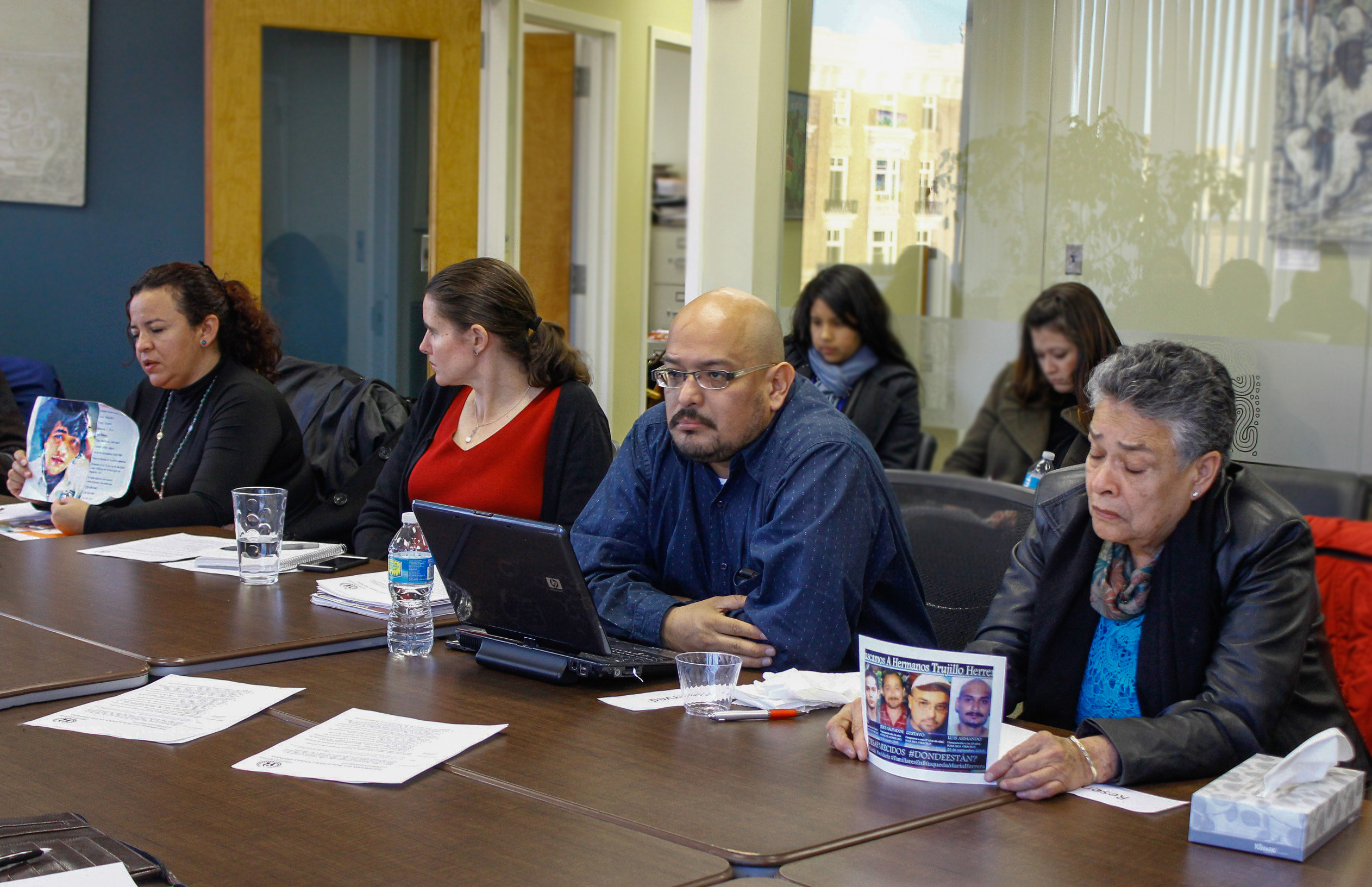 Maricela Orozco, Juan Carlos Trujillo Herrera, and Maria Herrera of the Familiares en Búsqueda María Herrera, a group of family members searching for their disappeared loved ones in Mexico, during their November 2015 visit to Washington, D.C. Photo credit: Angelika Albaladejo. |
On November 23 and 24, 2014, the Latin America Working Group Education Fund (LAWGEF) accompanied Maria Herrera (Doña Mari), her son Juan Carlos Trujillo Herrera, and Maricela Orozco of the Familiares en Búsqueda María Herrera, a group of family members of the disappeared organized in several states across Mexico. Familiares en Búsqueda participates in a national network of 40 similar groups representing over 2,000 families in the country. Familiares en Búsqueda aims to empower family members seeking to find their disappeared loved ones, fight for justice for the disappeared, and urge the Mexican government to address disappearances on a national level. LAWGEF accompanied the group in meetings with policymakers and local organizations to continue raising awareness about the ongoing and extensive problem of disappearances across Mexico.
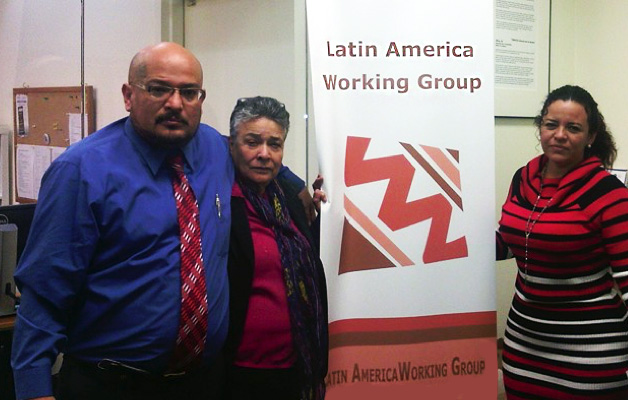 Juan Carlos Trujillo Herrera, Maria Herrera, and Maricela Orozco of the Familiares en Búsqueda María Herrera in LAWG’s office during a November 2015 delegation visit to Washington, D.C. Photo credit: Daniella Burgi-Palomino. |
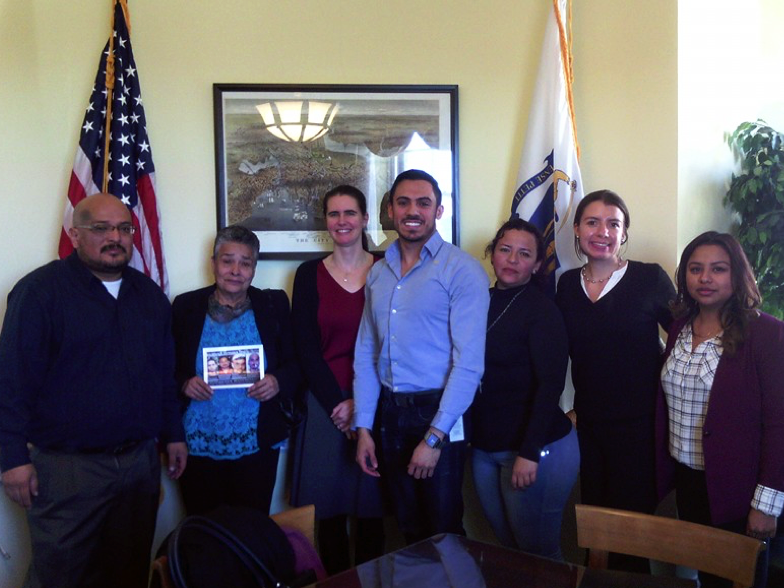 Members of Familiares en Búsqueda accompanied by Maureen Meyer of WOLA and Daniella Burgi-Palomino and Stephanie Santiago of LAWG (far right) during a meeting with Congressman Michael Capuano’s Foreign Aide, Samuel Rodarte (center), on November 23, 2015. Photo credit: Rep. Capuano’s Office. |
To date, the Mexican government has recognized an estimated 26,000 registered missing or disappeared persons in Mexico, though the real number is estimated to be much higher since many families say they are too afraid, or lack confidence in the appropriate authorities, to report their cases. Of the cases reported, the vast majority remain in impunity and the family members of the disappeared are left to search for their loved ones on their own.
In September 2014, the case of the 43 disappeared students from the Ayotzinapa rural teachers’ college highlighted the problem of forced disappearances in Mexico and the collusion or acquiescence of local and federal law enforcement, as well as members of organized crime, in these cases. However, as the Inter-American Commission on Human Rights noted during a visit to Mexico in early October, disappearances are widespread in Mexico and not isolated to the Ayotzinapa case. In the past year alone 106 bodies were found in clandestine graves in the state of Guerrero. Groups of family members of the disappeared have been organizing since the 1970s to find their loved ones and more recently have been gaining strength and organizing into national level networks to demand holistic support to family members of the missing and the immediate implementation of response mechanisms to address the issue of disappearances on a larger scale.
|
Family members of the disappeared have conducted their own investigations and searches for clandestine graves in the absence of government action. This video highlights the work of family members of the disappeared in the state of Guerrero who have valiantly worked to find answers in the thousands of disappearance cases in Mexico with their own tools and resources. |
The stories of Doña Mari, Juan Carlos Trujillo Herrera, and Maricela Orozco highlight the extent of the problem and the strength and determination of families to lead searches for the missing in the absence of government responses. Doña Mari and her son Juan Carlos Trujillo Herrera have been fighting to find their disappeared sons and brothers respectively for the past 7 years.
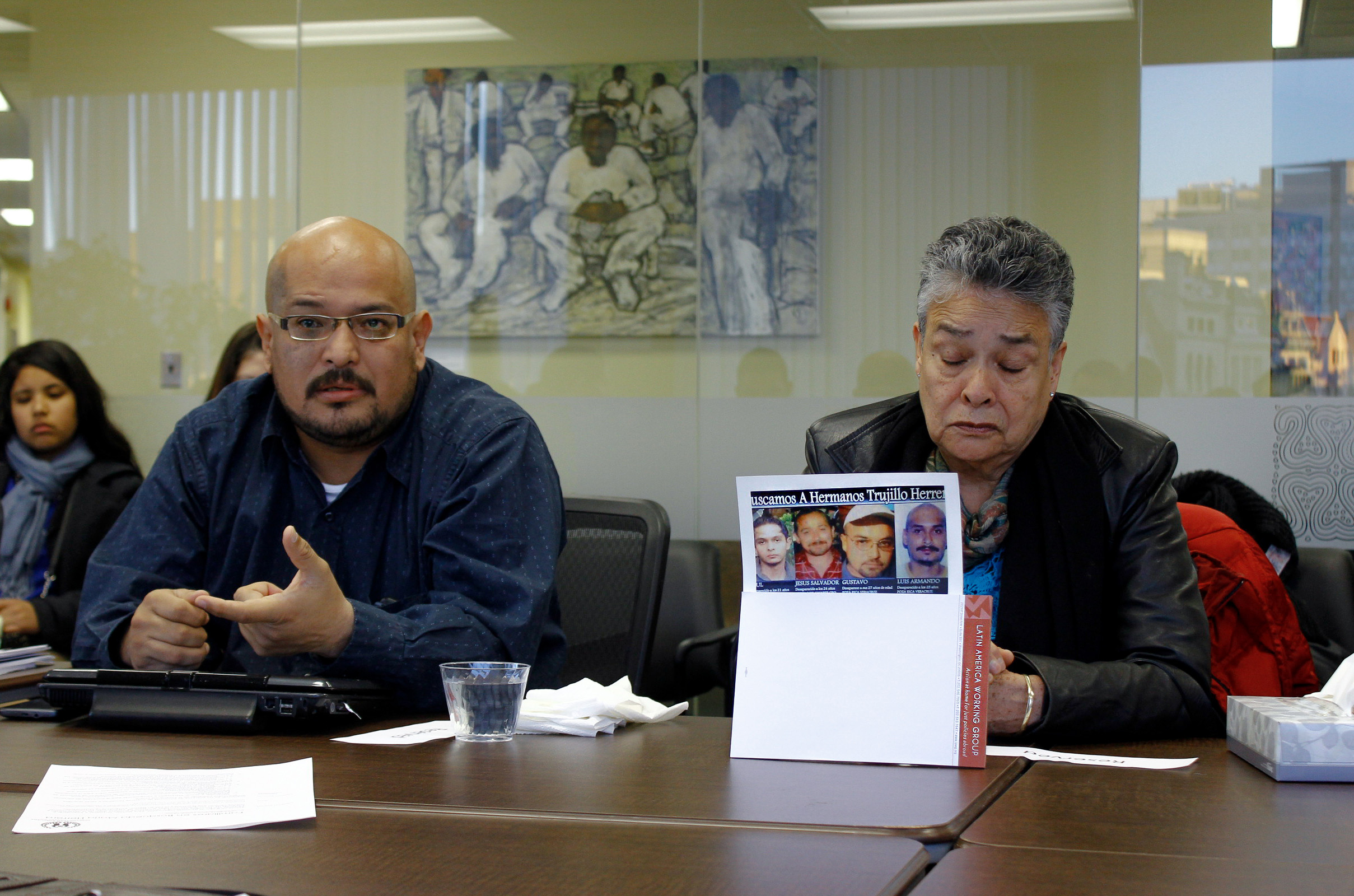 Juan Carlos and his mother, Doña Maria, during a November 23, 2015 roundtable discussion hosted by the Latin America Working Group and the Washington Office on Latin America. Photo credit: Angelika Albaladejo. |
In August 2008, two of Maria Herrera’s sons (Juan Carlos’ brothers), Jesus Salvador and Raul Guerrero, disappeared while they were working in the state of Guerrero collecting broken pieces of gold jewelry to melt down and resell.
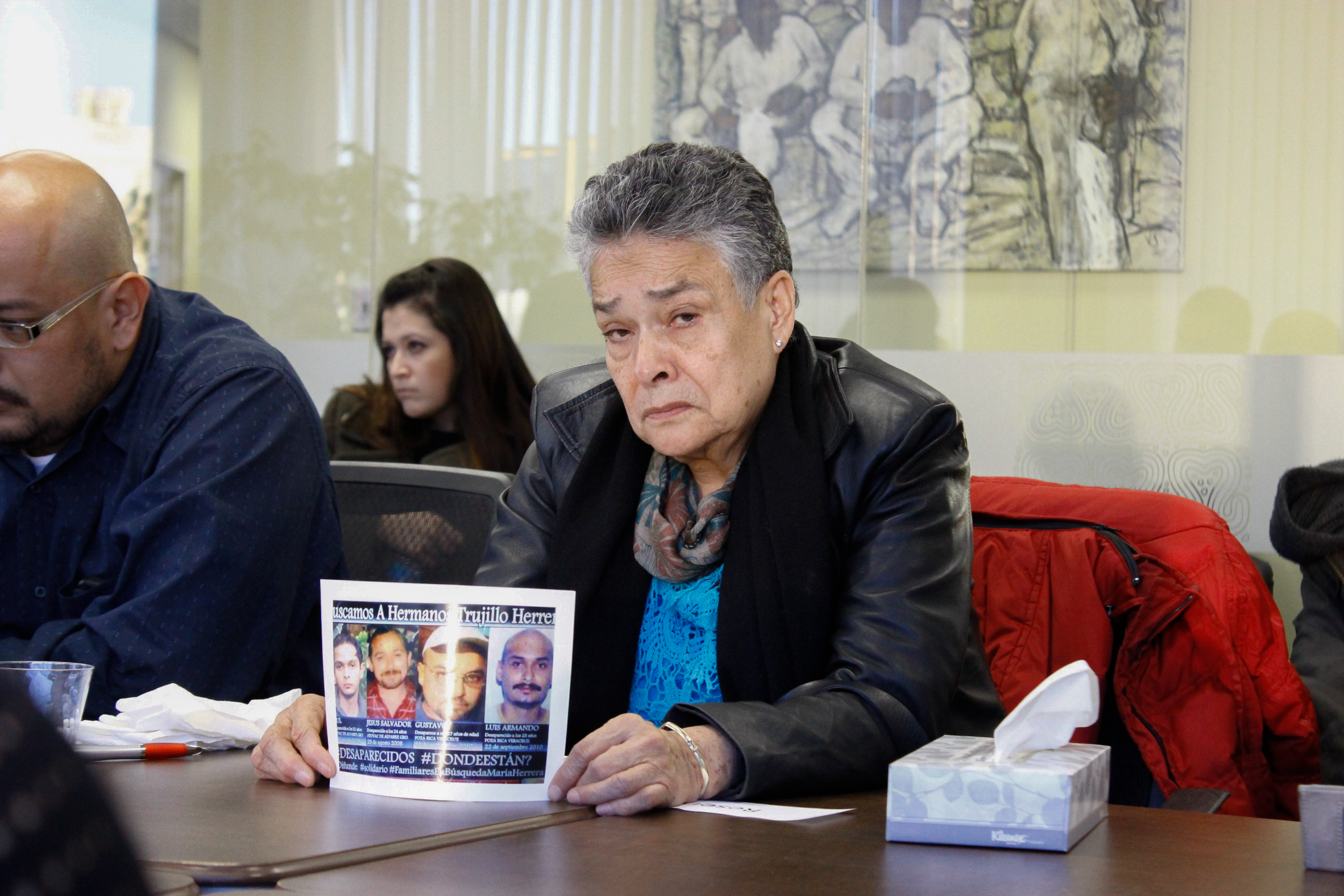 Doña Mari displays photos of her four disappeared sons during a November 23, 2015 public event. Photo credit: Angelika Albaladejo. |
Two years later, after running out of money because of the time spent looking for their loved ones, two of Maria’s other sons, Gustavo and Luis Armando, returned their work of buying gold. In September 2010 they were detained at a military checkpoint on a highway between Veracruz and Puebla and disappeared. Local police were implicated in both disappearances. Doña Mari and Juan Carlos Trujillo participated in the Peace Movement in Mexico, and in early 2015, together with other families, they founded the organization Familiares en Búsqueda.
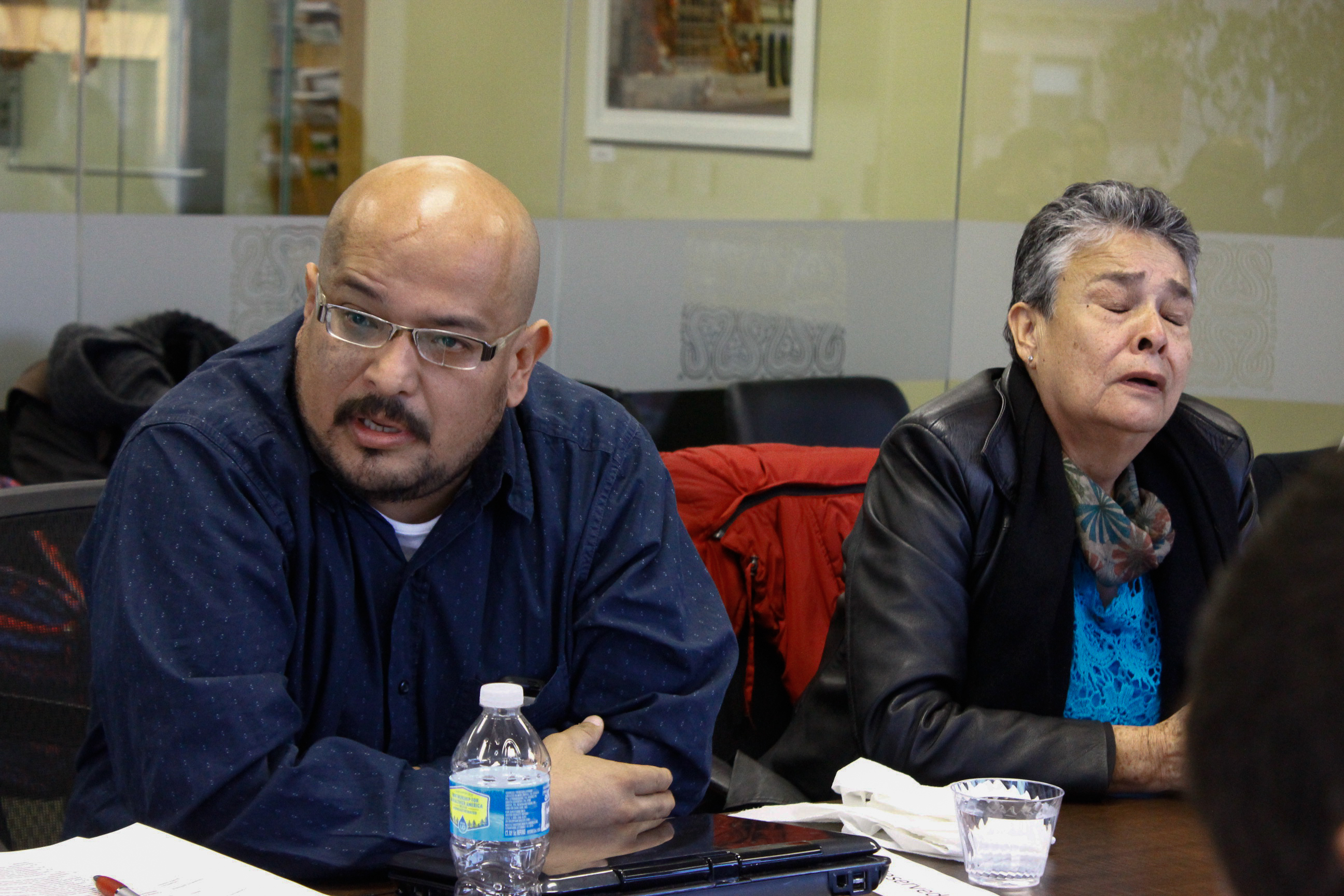 Juan Carlos and his mother Doña Mari. Photo credit: Angelika Albaladejo. |
Doña Mari and Juan Carlos have been threatened because of their work in search for the truth about what happened to their loved ones which they have had to take on largely on their own. Doña Mari says that she is “dead in life” because of the disappearances of her sons and yet she continues to find the strength to travel and speak out about the issue.
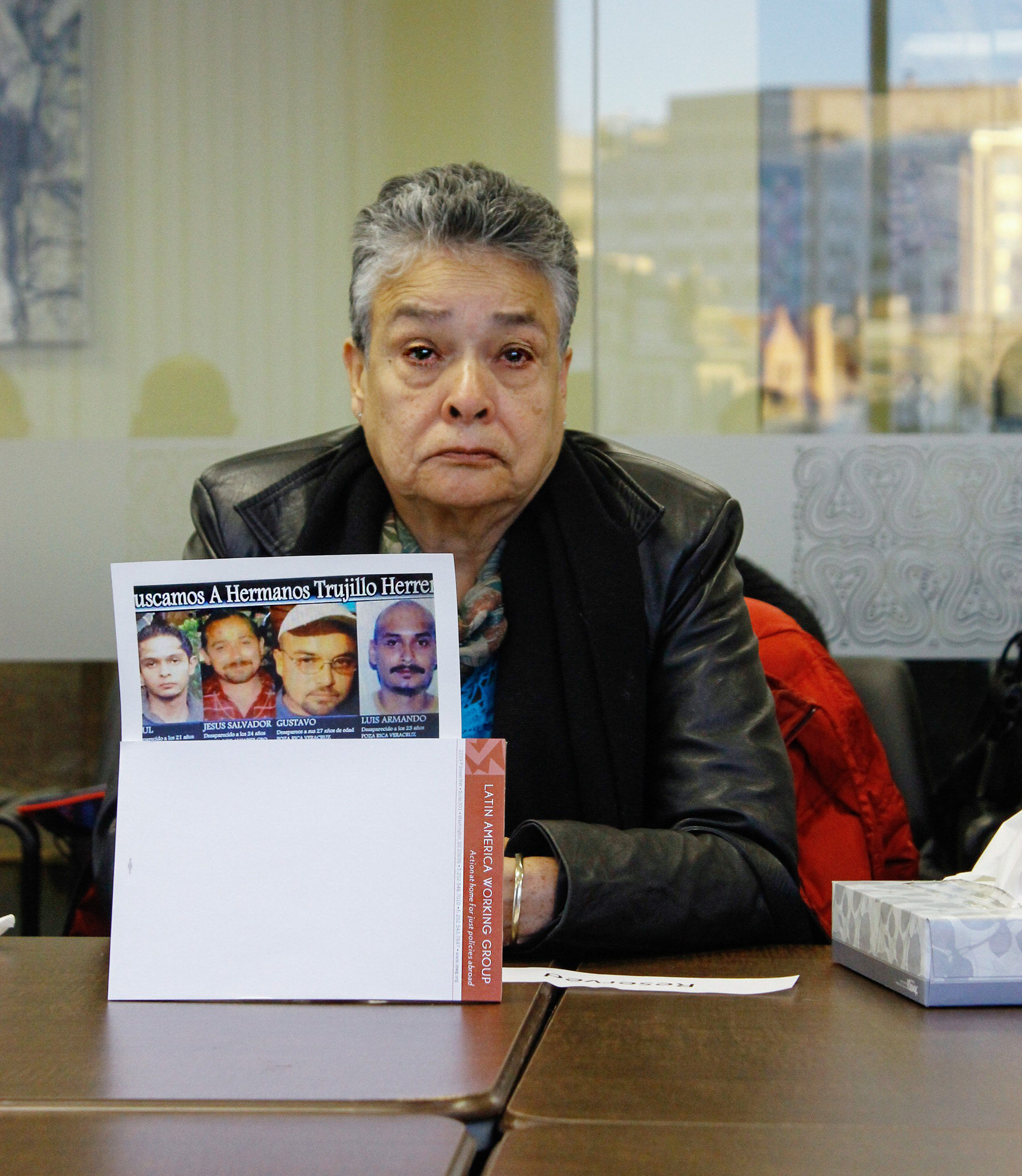 Doña Mari says she is “dead in life” without her four disappeared sons. Photo credit: Angelika Albaladejo. |
Maricela Orozco’s teenage son, Gerson Quevedo Orozco, was kidnapped in March 2014 while on his way to a store in Medellin de Bravo, Veracruz. His parents paid ransom and while they were waiting for news about their son, an alleged friend of his called the house and said he knew where Gerson was. Maricela’s other son, Alan, and her son-in law, Miguel Eliacim Caldelas, went to the place where Gerson supposedly was being held. When they arrived, they were pursued by a truck and shot at, both were killed. To date, although authorities from Veracruz have told his family they are investigating the case, Gerson’s whereabouts remain unknown.
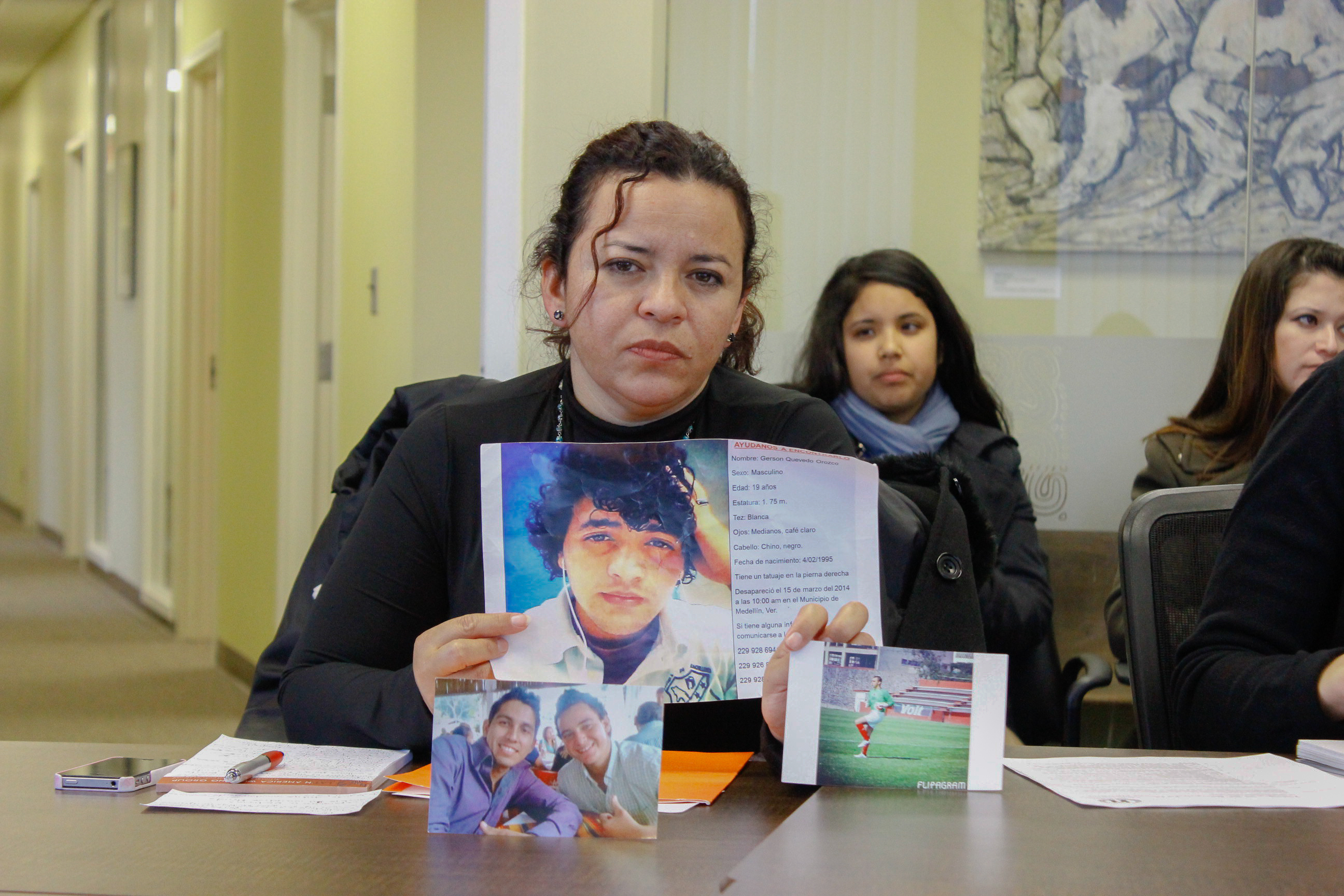 Maricela Orozco displays photos of her sons, one of whom was disappeared. Maricela’s youngest son was murdered alongside Maricela’s son-in-law. Photo credit: Angelika Albaladejo. |
Maricela has been told by authorities that her son was likely involved in organized crime as a motive for the disappearance. Maricela was forced to move to Mexico City with her husband and daughter, leaving her home in Veracruz after receiving death threats due to her work to find her son. She has received only minimal support from the Executive Commission for Attention to Victims (Comisión Ejecutiva de Atención a Victimas). Her disappeared son was an architecture student and an avid soccer player. She only has her daughter now and is fiercely protective of her for fear that she’ll lose her too.
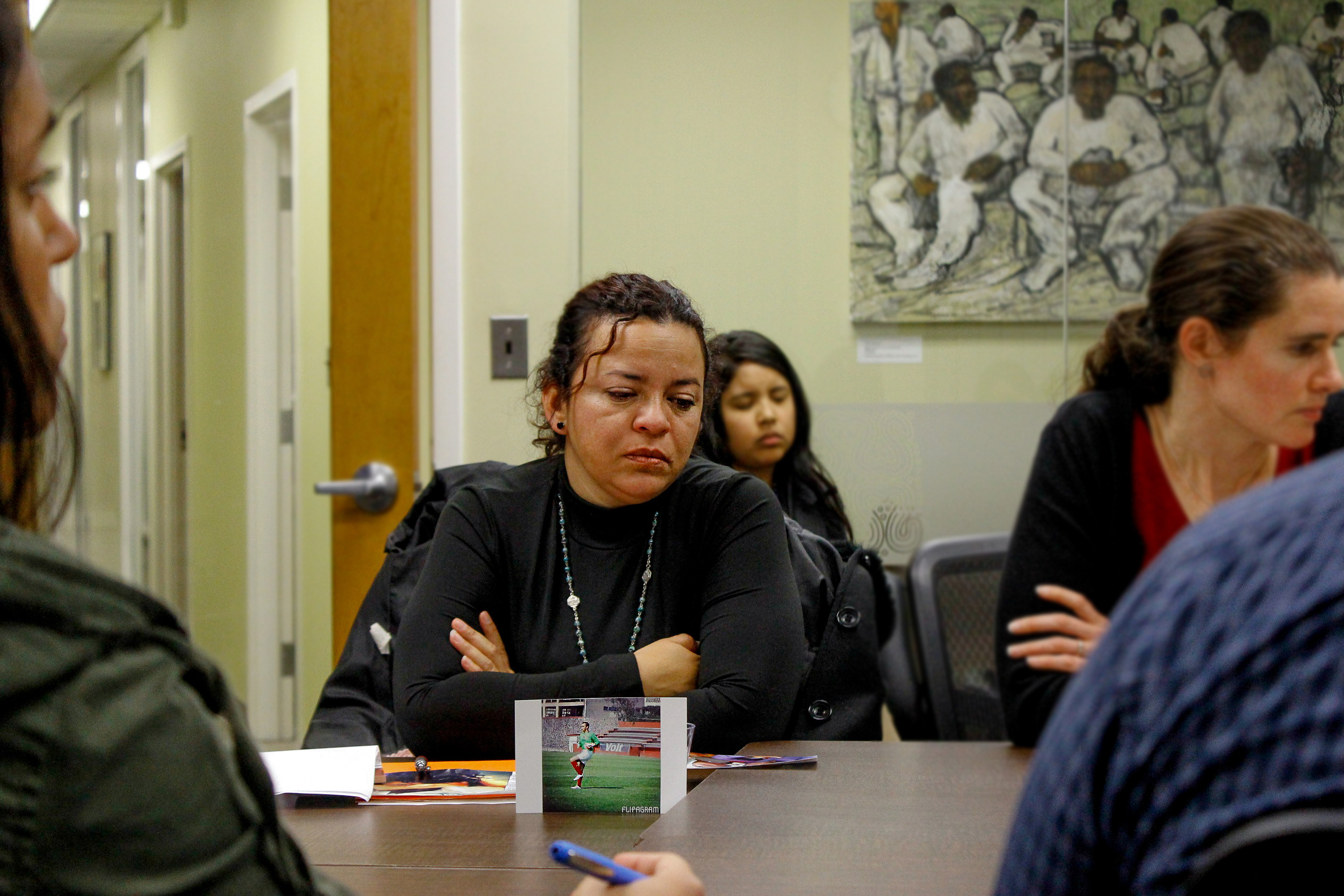 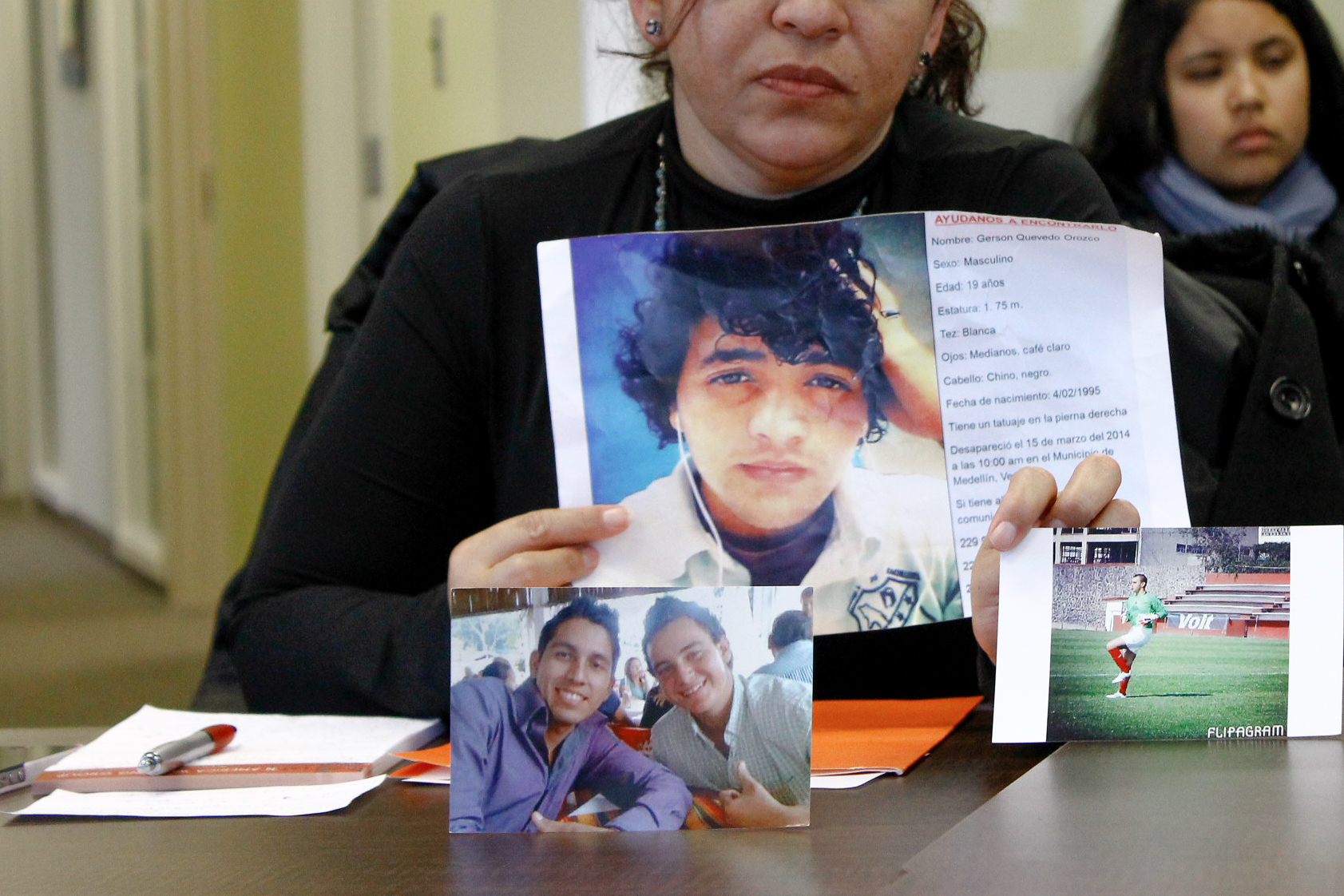 In spite of being displaced from her home by the threat of violence, Maricela Orozco continues to search for her missing son and works with Familiares en Busqueda to help other families whose loved ones have been disappeared. Photo credit: Angelika Albaladejo |
As Doña Mari, Juan Carlos, and Maricela have personally experienced, family members of the disappeared face multiple obstacles and delays in getting the relevant governmental authorities to investigate their cases. Often, they are turned away, given limited access to files or asked for money to complete certain procedures. There is also a lack of coordination between state and federal authorities in investigating cases which further obstructs any progress. Some family members are even made to feel like delinquents throughout the bureaucratic procedures. Despite the large number of forced disappearances, as of 2012, only two convictions had been reported for forced disappearance; neither case received a final judgment.
A Specialized Prosecutor’s Office to Search for the Disappeared within the Attorney General’s Office was created in October 2015, replacing the former Specialized Unit established in 2013. This office now has the mandate to search, investigate, and prosecute cases of disappearances. However, family members of the disappeared have raised concerns about the former Specialized Unit being very understaffed and lacking the necessary equipment to investigate all of the cases it has taken on. Even more concerning is that the new Specialized Prosecutor’s Office has been assigned an even lower number of staff and its overall budget for FY 2016 has been decreased by 34% compared to previous years. A proposed Forced Disappearance Law is also currently being discussed in the Mexican Senate and should be approved before the end of the year.
Incorporating and addressing the concerns of the thousands of family members of the disappeared in Mexico in any of the legislative or institutional mechanisms being developed would be a crucial first step to begin to address the alarming number of disappearances in Mexico. Family members like Doña Mari, Juan Carlos Herrera, and Maricela Orozco –in addition to thousands of others like them— have had to take it upon themselves to search for their missing loved ones and have a right to be heard and to receive the justice they deserve.
 Doña Maria, Maricela, and Juan Carlos of Familiares en Búsqueda with Maureen Meyer of WOLA, Daniella Burgi-Palomino of LAWG, Isabel Castillo of LATN/RRUUC, and Laura Carlsen of the Center for International Policy (CIP). Photo credit: Angelika Albaladejo. |

